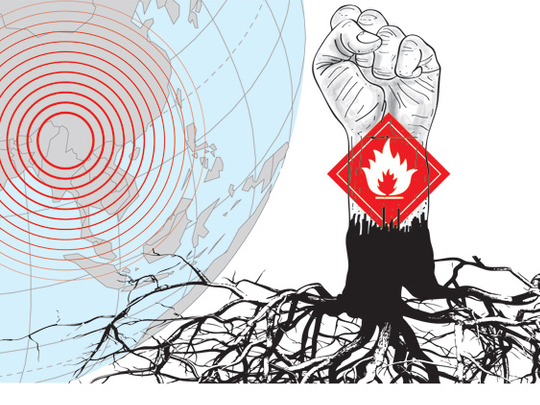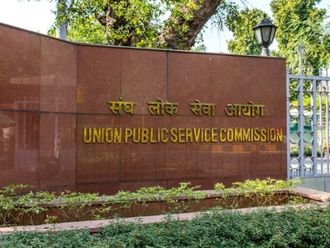
India has a new prime minister; and each of Asia’s four most powerful nations is now led by a combative nationalist. The multilateralist assumptions of the postwar order are giving way to a return to great-power competition. Nationalism is on the march, and nowhere more so than in the rising east.
On the face of it, Narendra Modi’s victory in India’s general elections had little connection with geopolitics. Modi’s pitch was to a nation tired of the incompetence and corruption of the Congress party. His promise was faster economic growth and rising living standards. His ambitions, though, reach beyond the domestic: India should be China’s match on the global stage. Modi’s Hindu nationalism fits the temper of the region. China’s President Xi Jinping wants to restore the Middle Kingdom to past pre-eminence. Deng Xiaoping’s caution has been replaced by demands for due deference to Chinese power.
In Toyko, Prime Minister Shinzo Abe’s economic programme is driven by a resolve to rebuild Japan’s capacity to stand up to Beijing. Vladimir Putin, the fourth of Asia’s nationalist horsemen, has shown with his military intervention in Ukraine Russia’s contempt for a cooperative international order. Abe hopes Tokyo will be the first port of call when Modi steps out overseas. The Indian prime minister-elect, officials say, shares Abe’s temperament and goals. The talk is of a grand strategic bargain. Japan has the technology and investment to speed up India’s economic development. Delhi will be a powerful ally in containing China. Each has territorial quarrels with Beijing — Japan in the East China Sea and India on its northern border. Both worry about Chinese naval power in the Indian Ocean.
The Sino-Japanese relationship could hardly get worse. Beijing is pressing its claims to the disputed Senkaku (in Chinese, Diaoyu) islands in the East China Sea. Abe has struck a revisionist pose by visiting Tokyo’s Yasukuni shrine, where class-A war criminals are honoured alongside fallen soldiers. Barack Obama’s US administration, bound to Japan in the region’s pivotal security alliance, finds itself trying to deter Beijing while restraining Tokyo.
After confronting the West, Putin is turning East. He was in Beijing last week to clinch a big gas supply deal. The contract is intended as a signal to western critics that the Kremlin has alternative markets for its hydrocarbons and a powerful friend in the rising world. For the moment, the arrangement suits Xi. China needs the gas and Russia can be a convenient ally at the United Nations. Beijing, like Moscow, sees the present international system as skewed in favour of the West. The partnership, though, is unequal. China is scornful of Russia’s failing economy and of the social and demographic trends dragging the country into decline. Putin’s role, then, is that of the useful idiot.
Abe thinks Kremlin can be tempted to hedge its bets. Russia is nervous of China’s growing presence in a fast-depopulating Siberia. Over time, Chinese citizens may become the dominant ethnic group in the Russian far east. How long before Beijing applies to Chinese citizens on Russian soil the doctrine of extraterritoriality Putin has deployed in Ukraine? Abe, who has been sotto voce (in a low voice) in his criticism of Russian annexation of Crimea, calculates it is time to “normalise” Russo-Japanese relations. This turning kaleidoscope of rivalries and realignments is further complicated by a swirl of collisions involving smaller players. China is in angry dispute with Vietnam and the Philippines over competing claims in the South China Sea. South Korea should be a natural ally of Japan, but Abe’s reluctance to acknowledge the sins of Japan’s imperial past nudges Seoul towards accommodation with Beijing. China accuses Washington of turning neighbours against it. More likely, China’s heavy-handedness is driving them into America’s arms.
One consequence of this is a rapid build-up of military forces across the region. China and Russia have set double-digit increases in their defence budgets. The Indian military has secured a similar rise, and intends to lay first claim on the fruits of Modi’s promised economic revival.
For his part, Abe wants to reinterpret Japan’s post-war constitution to ease the constraints on its capacity to deploy force. At a glance, his proposed changes seem modest enough but, set in the context of the times, they speak to a strategy of building a network of security alliances against China.
Stir in the toxic legacy of disputed history and the absence of international mechanisms to settle the border spats, and the region looks ever more combustible. For now, the US holds the ring. American power may be waning, but it still outguns everyone else. The question uppermost in the minds of every Asian leader is for how long?
Watching Washington’s retreat from the Middle East, many of its allies have doubts about the longevity of the US security guarantee. Japanese and South Korean officials say they need the US in the short to medium term, but must make their own plans for the long term. China’s strategy looks pretty clear - to push the US out of the western Pacific and claim tribute from its neighbours. It will push and prod to test Washington’s resolve.
What’s wrong with nationalism, a friend in Tokyo asked me the other day? Well, there is much to be said for patriotism. As for nationalism, the answer is found in the bloodied pages of European history. I doubt, though, that Asia’s four horsemen have taken the time to read them.
— Financial Times








